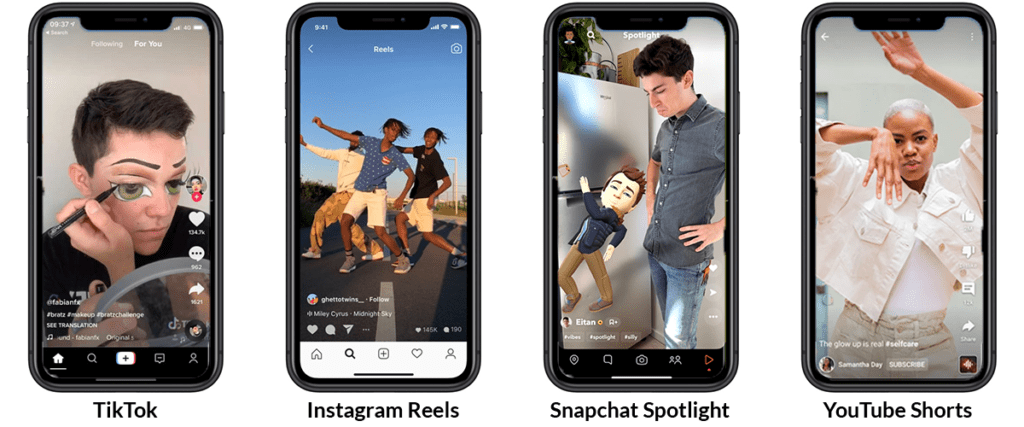
Ad revenue from TikTok will surpass $6 billion in 2023 – more than triple what it was in 2020. Pending the ban of the platform, TikTok ad revenue is projected to approach $14 billion by 2026.
For many advertisers, TikTok being banned in the US would mean social media strategies would have to be entirely reorganized in order to maintain the same level of revenue. Even for advertisers who aren’t on TikTok, the ban of TikTok would mean greater competition on the other platforms.
In this article, we’ll explore why there’s talks of a US TikTok ban in the first place, and what a TikTok ban would mean for digital marketers.
Why Might TikTok Be Banned?
Why is this all happening? Some US lawmakers see TikTok as a national security threat, believing it’s being used by the Chinese government to not only spy on US users but to spread potentially “harmful” content via the powerful TikTok algorithm.
In fact, the US FBI Director Christopher Wray has even spoken out about TikTok, saying that risks include controlling data collection and controlling the recommendation algorithm in order to influence users. With TikTok reaching over half of US adults, there’s a significant opportunity to collect data from and influence a large mass of the country’s population.
Indiana’s Attorney General Todd Rokita has also taken action against TikTok, filing two lawsuits against the app in December 2022. One was for promoting inappropriate content to young users, and the other was for misleading customers to believe that their data was protected from the Chinese government.
TikTok has already been banned from being downloaded or accessed on US government devices (including for the US military, Department of Homeland Security, and others) and at some universities. Some members of the Senate Intelligence Committee have even sent letters to Google and Apple requesting that the app be removed from their app stores.
The fears aren’t totally unfounded. In late December 2022, it was found that ByteDance employees were tracking US-based journalists with TikTok user data. TikTok called the event an “egregious misuse” of user data, and those employees are no longer employed by TikTok.
What Are ByteDance & Project Texas?
ByteDance, the parent company of TikTok, is a Chinese company that operates a wide range of global content platforms. ByteDance has been hard at work trying to get the US government to believe that TikTok isn’t a national security threat.
White House officials have told TikTok that it needs to divest from ByteDance.
You may have heard of Project Texas, which is TikTok’s $1.5 billion effort to rebuild its app on US servers, wall the app off from ByteDance and China, and weave in more oversight and transparency.
As part of Project Texas, TikTok is partnering with major software company Oracle to host US user data, review the code for TikTok’s algorithm, and run traffic through a secure cloud infrastructure. The US government would also be involved in overseeing access to user data. TikTok says that if Project Texas were in place, the data misuse from December 2022 wouldn’t have been possible.
What Would the TikTok Ban Mean for Ecommerce?
If TikTok is banned in the US, digital marketers will have to reconsider their presence on the other social media channels.
Some of the top platforms have already co-opted many of the features that define TikTok. For example, with Instagram Reels, users can record and edit videos up to 90 seconds, with the ability to add special effects, music, or their own audio. Using the Spotlight tab on Snapchat, users can scroll through videos from users across the globe and browse trending videos and sounds. YouTube is also competing with TikTok with YouTube Shorts, which are 60-second videos that users can post using audio from eligible videos in YouTube’s library.

Instagram and YouTube still have more monthly active users than TikTok by a significant margin (while Snapchat is lower than all three).
Platform Monthly Active Users
| TikTok | 1.1 billion |
| 2.0 billion | |
| Snapchat | 635 million |
| YouTube | 2.5 billion |
Since the likelihood of a TikTok ban is up in the air, most businesses aren’t prioritizing a contingency plan for what they’ll do if it happens. However, right now, as a recession looms and companies focus on saving money and reducing risk, some advertisers may decide to put their ad dollars somewhere else to be safe.
An overwhelming trend that we found in our 2023 State of Digital Marketing Survey is that the majority of marketers plan to maintain the same ad budget as last year, but still have bigger YoY growth goals to hit than last year. That’s compared to 2022, when the majority of the marketers we surveyed said their ad budget would increase.
Since businesses are trying to do more with less, taking a risk by investing in TikTok may not be something some businesses are willing to do right now. For brands with an active Gen Z audience, it may be wise to proactively test advertising on Instagram Reels, Snapchat Spotlight, or YouTube Shorts if you’re not doing so already. A TikTok ban would mean that competition would increase for advertisers on these platforms.
TikTok isn’t just an upper-funnel play – it can be a full-funnel marketing channel. If TikTok was banned, businesses would need to reallocate social media budgets across the different channels. Entire social media marketing strategies would need to be reconsidered to ensure incremental user gains aren’t lost.
Our social media teams have noticed that it’s become increasingly important for creative to be developed per channel. The video that works for Facebook is very different than the video that works for TikTok. It doesn’t make sense anymore to do one photoshoot and crop the image a few different ways. Businesses need to think about why a user is opening TikTok vs. Instagram, and what they expect from brands on each platform.
If the TikTok ban does happen or your business decides to step away from the platform, you will want to be sure to remove the TikTok tracking pixel from your website. One of the ways to improve your site speed is to reduce the impact of third-party code, and if you unnecessarily have TikTok’s tracking pixel on your website, you may be slowing down your website.

Tying It All Together: What Would a US TikTok Ban Mean for Advertisers?
It’s unclear whether TikTok will be banned in the US, but the proceedings are definitely something that digital marketers should keep an eye on – especially with TikTok ad revenue skyrocketing over the past several years.
At ROI Revolution, we develop and execute well-informed strategies for brands based on an expert understanding of what’s going on in the ever-evolving marketplace. We worry about staying on top of all the changes so you don’t have to. To explore how we can help you grow profitably, save money, and reduce risk, send a message to our team today.
Sources
- Vox, TikTok’s master plan to win over Washington.
- Reuters, U.S. FBI director says TikTok poses national security concerns.
- Statista, TikTok – Statistics & Facts.
- Forbes, TikTok’s In-App Browser Includes Code That Can Monitor Your Keystrokes, Researcher Says.
- Business Insider, Indiana is suing TikTok over claims it misled users about child safety and data security.
- AdWeek, What Brands Should Know in the (Unlikely) Event of a TikTok Ban.
- NPR, Lawmakers turn up the heat on TikTok’s CEO Shou Zi Chew in high-stakes hearing.
- Instagram, Introducing Instagram Reels.
- Snapchat, Snap Creators, Spotlight Content Best Practices.
- YouTube, Bringing YouTube Shorts to the U.S.
- eMarketer, US Senate’s move to ban is the latest reprisal against TikTok.
- Statista, Most popular social networks worldwide as of January 2023, ranked by number of monthly active users.
- Investopedia, What Would a US Ban on TikTok Mean for Businesses?
- Digiday, Marketing Briefing: U.S. marketers prepare contingency plans amid potential TikTok ban.
- Shopify, How To Delete TikTok Code – Tracking Pixel – To Improve Speed.




